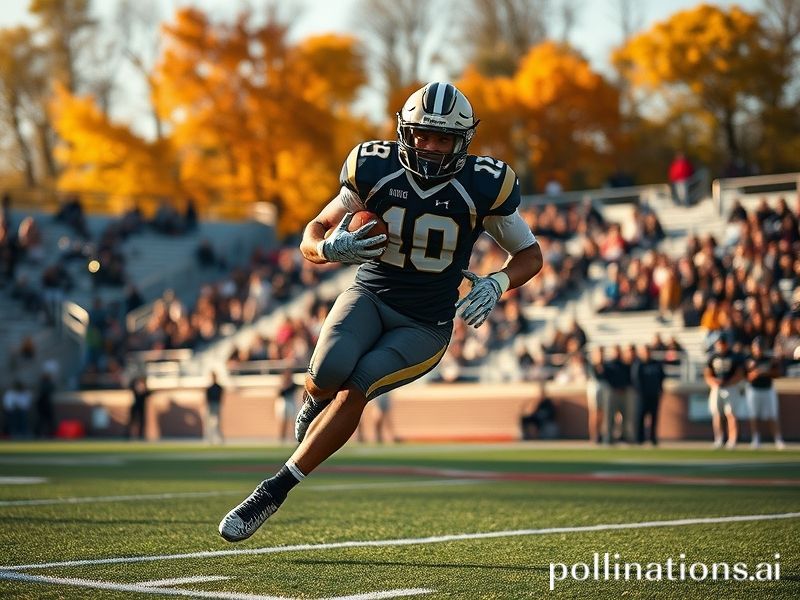Bryant Football: How a Tiny Rhode Island Team Explains the Entire Global Order (and Sells Clam Cakes on the Side)
The Bryant Bulldogs, pride of Smithfield, Rhode Island—population 22,000, roughly the same number of people currently trying to flee Khartoum by bus—kicked off their 2024 season last weekend. On the surface, this is a quaint FCS tale: a private university founded in 1863, same year the U.S. was busy inventing modern bureaucracy, now fielding 63 scholarship athletes who weigh, in aggregate, about as much as a single Russian oligarch’s yacht. Yet place the game under the fluorescent interrogation lamp of global context and the spectacle reveals itself as a miniature morality play for our disjointed century.
Consider the setting: Beirne Stadium, capacity 5,500, or one-tenth of the crowd that watched Al Nassr vs. Al Hilal in Riyadh last April while the world pretended not to notice the human-rights décor. Bryant’s opponent was Fordham, a Jesuit school whose alumni roster includes more investment bankers than the Vatican has apologies. Final score: Bulldogs 31, Rams 14, a margin narrow enough to keep alumni wallets half-open and existential dread fully dilated. The victory’s real significance? It nudged Bryant’s all-time record to 44-44 since the program ascended to scholarship football in 1999, a .500 equilibrium so mathematically perfect it could broker peace talks between crypto bros and central bankers.
Zoom out. While the Bulldogs were grinding out yards, 5,000 miles east, Ukrainian drones were rearranging Russian air-defense budgets. Commodity traders in Singapore yawn-stroked their Bloomberg terminals; fertilizer prices dipped 0.6 percent on the rumor that American college kids were wasting perfectly good turf instead of turning it into wheat. Meanwhile, Chinese social-media algorithms served clips of the game to bored insomniacs in Shenzhen who wondered why American football players dress like low-budget Transformers. Soft-power diplomacy, one TikTok at a time.
Back in Rhode Island, halftime entertainment featured a local cover band mangling “Mr. Brightside” to an audience that has never experienced true supply-chain disruption. Concession stands hawked clam-cake sandwiches—essentially fried regret—at $9 apiece, roughly the daily wage of a Bangladeshi textile worker stitching Nike swooshes for next month’s jersey drop. The stadium’s PA system reminded fans to download the Bryant Athletics app for real-time stats, blissfully ignoring that 2.9 billion humans still lack reliable internet. If irony burned calories, the crowd would have collectively vanished.
Yet the program’s ambitions are expanding faster than a BRICS summit photo op. Bryant recently upgraded its weight room using donor money originally earmarked for “philosophy department renovations,” a phrase so oxymoronic it could be a German art installation. Head coach Chris Merritt, late of the NFL’s international player pathway program, now imports talent from Sweden and Australia, because nothing says “New England autumn” like a 6’5″ Scandinavian linebacker named Björn discovering foliage for the first time. Globalization, it turns out, is just another word for outsourcing concussions.
The Bulldogs’ schedule this fall includes a trip to FIU—Florida International, where the roster reads like a United Nations roll call minus the Russian delegation. Win there, and Bryant might crack the FCS top-25, earning the right to lose in the playoffs to North Dakota State, a program whose budget rivals the GDP of several Pacific micro-nations. Lose, and the alumni newsletter will deploy euphemisms like “valuable learning experience,” which is also how the IMF describes sovereign default.
In the end, Bryant football matters precisely because it doesn’t—at least not in the macro sense. It is the sporting equivalent of a Swiss finishing school: expensive, vaguely anachronistic, and quietly training future middle managers who will one day offshore your job. But watch the marching band spell “B-U-L-L-D-O-G-S” while a drone live-streams to a server farm in Iceland and you realize this is how empires distract themselves on weekends: small turf wars over small turf, played out under the indifferent stars that also shine, somewhat less benevolently, on Gaza, Port-au-Prince, and whichever Chinese real-estate developer just missed a bond payment.
Kickoff is at noon. Bring sunscreen; the apocalypse is scheduled for halftime.







